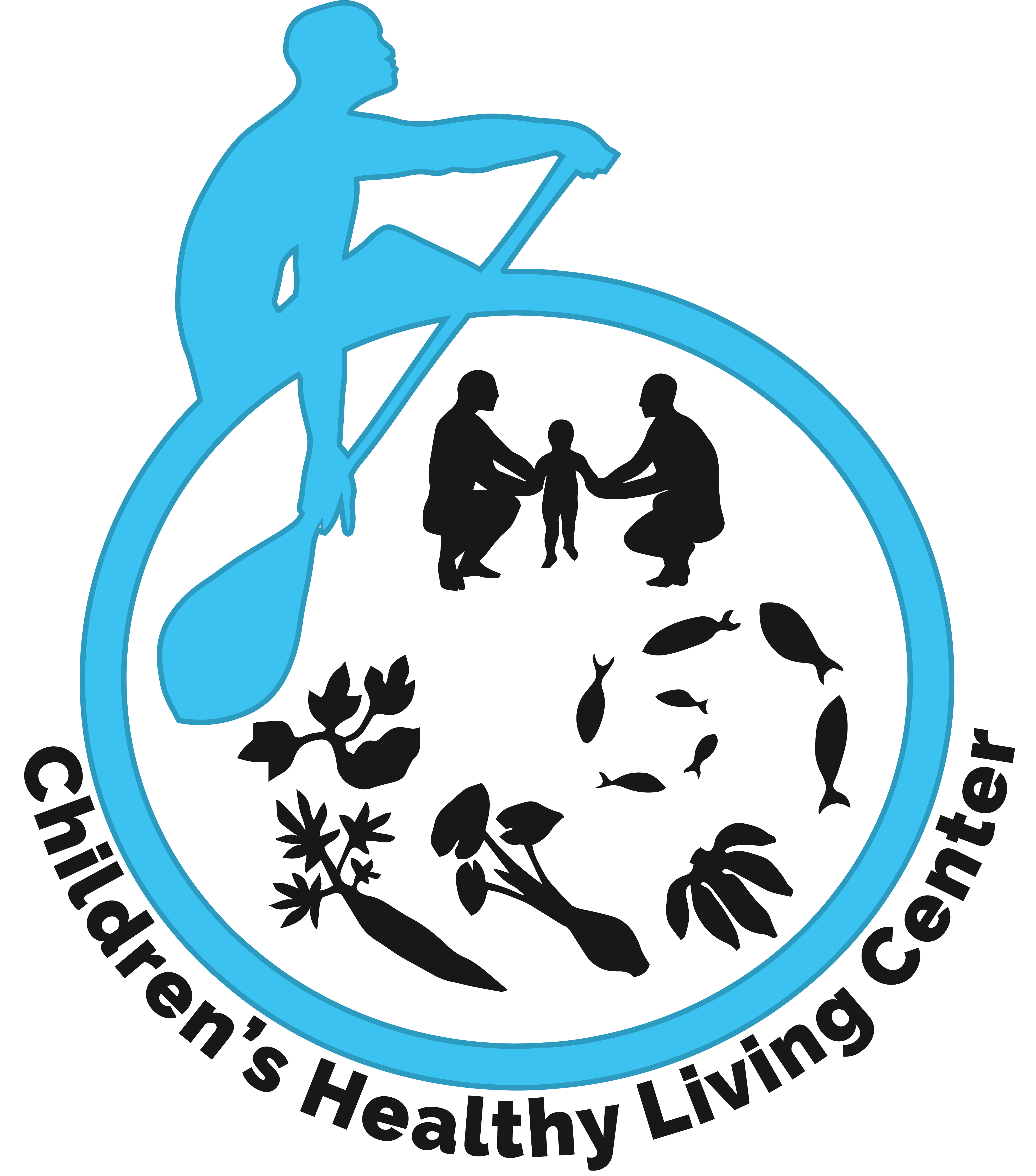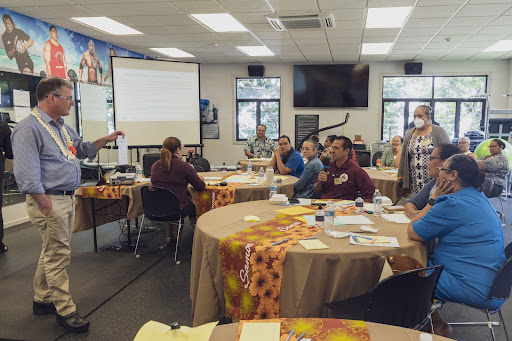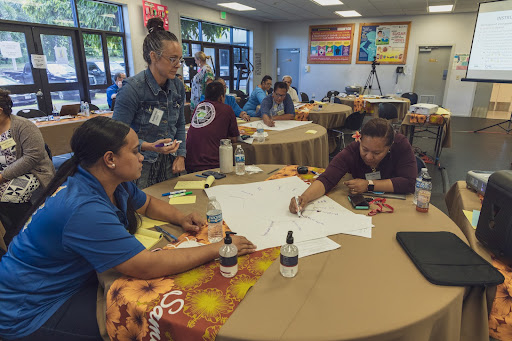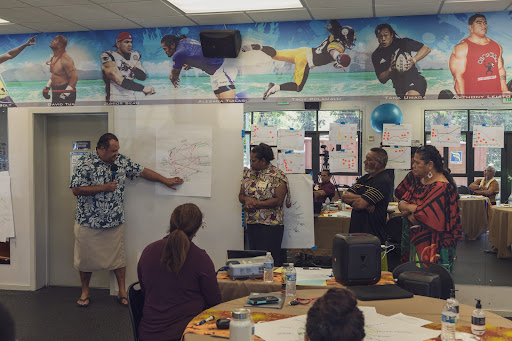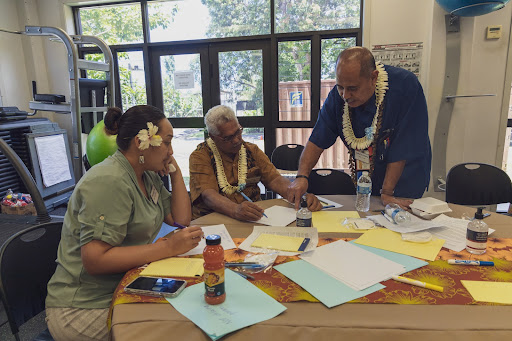Written By: Pauline McFall, Food Systems Trainee
In collaboration with the Children’s Healthy Living Program Program – Food Systems Grant (CHL-FS), American Samoa held their first Group Model Building (GMB) workshop in mid March 2023. The University of Hawaii at Manoa CHL-FS team facilitated the workshop with the local CHL team from the American Samoa Community College – Agriculture, Community and Natural Resources (ASCC ACNR) Land Grant department. The GMB workshop is a primary activity of the current CHL-FS funding from USDA National Institute of Food and Agriculture (NIFA). Its purpose was to facilitate discussion and elicit the knowledge and experience from participants in order to map the drivers of food systems that impact children’s diet and health in American Samoa.
The workshop was held on Thursday March 16th, at the ASCC ACNR Wellness Center. The CHL-FS team from Hawaii was led by Dr. Rachel Novotny (CHL-FS Principal Investigator) and included Dr. Jean Butel (CHL-FS Program Manager), Dr. Peter Hovmand (Systems Dynamics Scienctist/Specialist from Case Western University), Jordan Oshiro (CHL-Program Assistant), and Pauline McFall (CHL-FS trainee and PhD student). The American Samoa CHL team was led by ACNR Director Aufai A.R. Areta and included ACNR Land Grant administrative and support staff. Earlier during the week, the CHL-FS team held training sessions and workshops with the local CHL team and ACNR administration and staff.
Director Aufai and the local CHL team selected participants from various community partnerships and organizations representing both the government and private sectors in American Samoa. A total of 17 participants attended the workshop including the Department of Health (Maternal Child Health), Department of Health (Nutrition Counseling Services), Department of Education (School Lunch Program), Tutuila Greens and Farms, ACNR Instruction/Fruits for Life Greenhouse, ACNR Agriculture Extension Program (Animal Science Division), ACNR Agriculture Extension (Crops Division), ACNR Expanded Food Nutrition Education Program (EFNEP), Department of Human & Social Services (Women Infants & Children Division), Department of Education (Early Childhood Education), and Centers for Disease Control (Public Health Advisor).
The workshop welcoming and introduction was conducted by Director Aufai in both Samoan and English language. As customary in the Samoan culture, greetings and protocols are acknowledged and carried out in the native language, and then translated into English for non-native speakers. Dr. Rachel Novotny provided an overview of the CHL program as well as the foundations and goals of the food systems grant and the purpose of the GMB workshop. The workshop activities were then facilitated by Dr. Peter Hovmand, with Molly Lagai (ACNR Extension Program Coordinator) as Community Facilitator and Samoan translator. The facilitators led the participants through 4 GMB activities – Hopes and Concerns, Graphs over Time, Connection Circles, and Action Ideas. The participants were able to work in small and overall group settings to complete the various activities. This setting gave individuals and groups opportunities to become highly engaged and to bring and share their unique experiences and skills set to the table. This also provided the opportunity for participants to network, provide feedback from their organizations, and how to collectively work together to address the issues that affect children’s diet and health in American Samoa. The lunch break also provided an additional chance to collaborate and network over a delicious meal of traditionally inspired cooked fish and chicken, along with locally grown vegetables and starch.
From the various activities, certain themes and ideas emerged and were categorized into various clusters. For ‘Hopes and Fears’ these included: Healthy Behavior, Environment, Culture (specific to American Samoa), Health outcomes, Education/Knowledge/Experience. The ‘Graphs over Time’ activity had similar clusters that also included: Behavior, Physical activity and Policy. Another engaging activity was the ‘Connection Circles’ which brought about strong themes and inter-relationships identified by the various groups. These include: Social media influences and using it to our advantage, Family and Cultural dynamics and using it to promote better eating and health habits, Outreach programs and education out to the community (i.e. village programs, gardens, fruits and vegetables promotion, etc.), Policies, and Physical activity promotion. Another major theme that emerged is a need for a local advisory or council that will regularly convene and help to address these issues as well as formulate policies that can be supported at the executive and legislative branches of the local government.
Overall, it was a successful workshop that generated a lot of lively discussion, themes, and networking opportunities not only with the University of Hawaii CHL-FS team but with local partners from both the American Samoa government and private sector.
